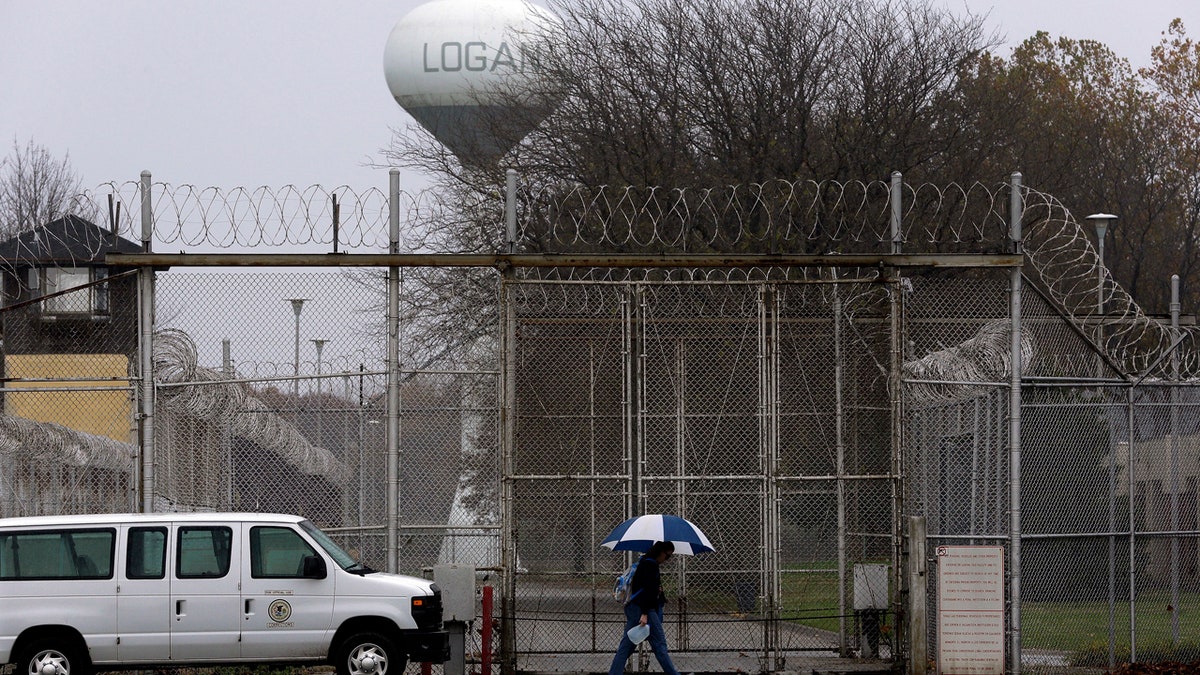
Security fences surround the Logan Correctional Center Friday, Nov. 18, 2016, in Lincoln, Ill. Inmates at Illinois' main prison for women are demeaned as "crazy" and "worthless" by staff in a facility that offers little help to prepare women to re-enter the community, a study to be released Friday found. (The Associated Press)
SPRINGFIELD, Ill. – Inmates at Illinois' major women's prison have been called "crazy" and "worthless" by corrections officers, are sometimes placed in an unpadded open-bar "crisis cage" and receive harsher discipline than men for similar offenses, a study released Friday says.
The federally funded review conducted for the Illinois Department of Corrections found that the mostly nonviolent women at Logan Correctional Center in Lincoln are often classified as higher security risks than necessary, which with disproportionate discipline needlessly extends their stays.
Segregation is overused as a punishment and the women get few chances to prepare for community re-entry, contributing to a recidivism rate of 50 percent — higher than the state's prison population as a whole, according to the report.
The National Resource Center on Justice Involved Women's assessment is harshly critical of the 2013 decision by former Gov. Pat Quinn's administration to close a women's prison in Dwight and move nearly 2,000 women into Logan, which was designed for 1,500. The "poorly planned, rushed and chaotic" move "set the tone for the culture that exists at Logan today," it said.
Corrections director John Baldwin pledged additional staff training.
Illinois is one of about a dozen states to undergo the assessment, for which states had to compete. The report advocates taking a different approach to incarcerated women because of their different emotional responses to stress and their histories. Ninety-eight percent of imprisoned Illinois women have experienced physical abuse, 75 percent have been sexually abused, and 85 percent have encountered emotional abuse. At the time of the review, 42 percent of the inmates qualified as seriously mentally ill.
Although women make up only a fraction of the population at Illinois' overburdened prisons, making life better at Logan is worth the effort, said Donna Collins, a Rhode Island state prison administrator who has helped implement gender-response changes in that state and was among the speakers scheduled to address a forum Friday in Chicago.
"Women are the backbone of the family," Collins said. "You're hurting the community if you continue to re-incarcerate women."
The study said there is inadequate training for staff members to deal with women's emotional responses. In interviews, staff members called inmates "crazy" and said they "talk too much," resulting in more discipline and good-conduct credit days taken away. But women are more relational and prefer to discuss things, as opposed to men, who tend to shut down, Collins said.
And women often don't relate well to prison security staff because they were typically at odds with authorities on the street, said Colette Payne, who spent five stints in prison beginning at age 14 and was part of the assessment team.
"If I've been raped and you are yelling at me like my abuser, I see you as that person," said the 49-year-old who now runs a support group for former women inmates. "I'm looking at you like you're my abuser, that's where the tension comes in."
Payne was shocked to see the use of the so-called "crisis cage," where women are placed in a stand-alone cell without privacy or padding; the department has pledged to replace it.
The report notes that inmates making "crisis calls," in which they feel a threat to themselves or others, increased dramatically from early 2014 to late 2015, and monthly suicide attempts increased tenfold since the Logan consolidation.
The report praises the state Corrections Department for agreeing on necessary change and constructing a mental-health unit at the prison.
Baldwin, who also addressed the Chicago forum, called the haphazard 2013 consolidation "a setup for failure" and said the agency is adding staff training, "from how to work with women who have a mental illness to how to be more effective in communicating with offenders." Ed Caumiant, corrections liaison for the prison guards' union, the American Federation of State, County and Municipal Employees, said the union is ready to work with the department on adequate staffing as well as training.
Deanne Benos, a former Corrections assistant director whose Chicago-based Women's Justice Initiative coordinated the project, said one reason Illinois succeeded in the competitive grant process was Republican Gov. Bruce Rauner's criminal justice reform pledge. He wants to reduce the prison population by 25 percent by 2025.
"Meaningful changes can be made with limited resources," Benos said. "Even changing some of the rules and operational practices at Logan can have a dramatic impact on the facility."









































